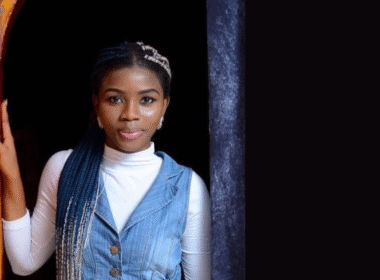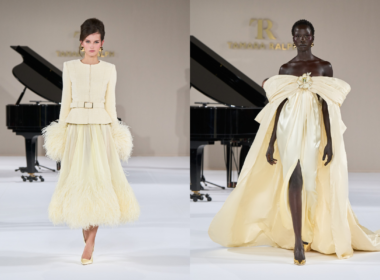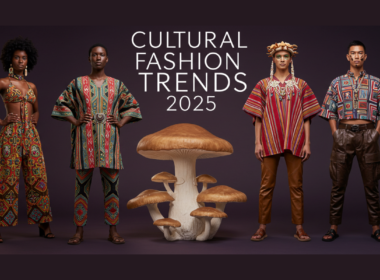As the Paris Olympics captivate audiences worldwide, another groundbreaking event is set to take the city by storm. Women International Trade Connect (WITC) is poised to host its inaugural Paris Olympics Trade Show, a monumental gathering of over 50 Pan-African women in the creative industries. From fashion and leather goods to accessories and skincare products, these talented entrepreneurs will showcase their unique creations at the heart of the Olympic festivities. FAB L’Style Magazine had the privilege of sitting down with Nneka Abiakam-Madunatu, the founder, and some key executives of WITC to delve into the vision and impact of this pioneering event.

FAB: Women International Trade Connect (WITC)—what’s the story behind the creation of this unique organisation?
Nneka Abiakam-Madunatu: WITC is like an ecosystem. It is something I like to call “for us by us.” For years, we’ve been asking for support for women in business, fashion designers, and creatives. Every year we request something, wanting to scale to global markets and expand distribution, but nothing has been done about it.
So, we came together. They don’t feel our pain because we want to be seen, we want to earn money in forex. Fashion designers around the world make so much money with their creativity, and African fashion is extremely popular now. Anything African is in demand. Look at what our Afrobeat music is doing. Music doesn’t need permission to enter a space, as Mohbad said. That’s why everyone is embracing Afrobeat now. In the past, when people didn’t have access to social media, we had great musicians too, but they weren’t seen like today’s artists. I believe our fashion and creativity haven’t been fully recognised either. So, a group of women came together to form an ecosystem where we could tell our own stories. We’re not waiting for anyone now. Women International Trade Connect will educate, provide funding, and empower.
We’re starting this year with the Trade Festival. We have about 50 African women coming from all over Africa, not just Nigeria, to showcase their work. We’ve enlisted experts to conduct a masterclass on intellectual property. At the end of this conference, we’ll invite buyers so that it’s not just a trade mission; we aim to get our products into major stores in Paris. Paris is our fifth edition. We’ll go to Dubai next year, and then to Canada. The goal is clear: for example, if Harriet is in Vienna and she is an African business owner, she will start working on getting our products into stores there. We need to tell our stories well. If I come to France and want to buy African fashion, I shouldn’t have to go to the ghetto. If you come to London and want to buy African fashion, there should be an organised space.
WITC will have representatives in different countries working on getting us into reputable places. If we plan a trade show in Vienna in three years, Harriet will work on securing stores in Vienna so that our women can participate and compete on the global scene. In Paris, after the trade show, we aim to get many of our participants into major stores. The most interesting thing about WITC is our long-term plan: the major goal is to build and attend African spaces. The first one will be launched in 2030, featuring food, fashion, music, and art. When you come to Paris, you’ll see galleries like Lafayette or Selfridges, but it will be just for Africa—five or six floors dedicated to African food, fashion, and art curated in an organised space. That’s our vision for 2030.
We will launch this vision with the Motherland Mall, announced at a Gala to close the Trade Festival. This gives us a Plan B: instead of going into debt to be included, we will include ourselves. We won’t need to collaborate with other brands; we will create our own spaces. We’ll have something like mini-African centres in 10 major cities, with the festival launching in 2030.
More Like This:
The Women International Trade Connect (WITC) Debuts in Paris
FAB: How are participants selected for the trade show, and what criteria do you use to ensure a diverse and impactful lineup of exhibitors and speakers?
Nneka Abiakam-Madunatu: For the speakers, we look for individuals who have worked in Africa and are passionate about the continent. We have robust inclusion and diversity strategies in place. We’ve been considering this for a while because, in business school, we often discuss ESG (Environmental, Social, and Governance) and inclusion. We continually note that Africa is not included as it should be. This inspired us to use the trade show as an opportunity to showcase African talent, as many people will be coming to Paris. This will be a great way for African women to gain visibility. Stay up to date on the latest in fashion, arts, beauty, and lifestyle by following FAB L’Style Magazine.
As for the women participating in the trade show, the main criterion is simple: you just need to be an African woman with a dream. If you have a vision, have worked hard, and want to push further, you are welcome. There are no special requirements. Many African women are held back and don’t have the opportunity to show their potential. This trade show aims to give them that chance.
FAB: How does WITC ensure that it reaches and includes women from the most underserved and remote communities in Africa? How are you reaching this set of people?
Nneka Abiakam-Madunatu: I’m glad you mentioned Mushin. We produced 400 Aso-Oke keyholders crafted by men and women from Mushin, which will be sold during the WITC. This initiative is part of our sustainability efforts. These keyholders are made from repurposed Aso-Oke dresses, transforming what could be waste into valuable products due to climate change concerns. The production chain is extensive, and we ensure that the revenue generated directly benefits the people of Mushin. In fact, as we speak, we are packaging these keyholders, which will be shipped to France by this weekend.
We are committed to working with grassroots communities. We engage with people in Balogun, Yaba, Aba, and many other areas. For example, there’s a woman in Ibadan who runs a tie-dye school, training others in this craft. No matter how challenging the situation, people need opportunities. The keyholders I mentioned could significantly impact lives if a store like Primark takes them up. This could potentially increase the revenue for those in Mushin by tenfold or even two hundredfold, changing their lives drastically. The unemployment rate in Nigeria is rising, but these initiatives can help.
We are also in discussions with many stores, which often mention the lack of structure for African products. They cite their work with women in India as an example. Our response is, “We apologise, but we will create that structure.” We are the structure. The women I work with are passionate and ready to collaborate. I have a dedicated team, including Okikiola, our Head of Brands and Sustainability.

Uche: WITC is founded on the principle that African women must save themselves; no one else will. Your question about grassroots involvement captures the essence of WITC’s mission. The women on our board have travelled extensively with their brands, employing people from grassroots communities and striving to take their brands global. These are well-educated women who left professional jobs to promote other women, but it’s been challenging coming from Nigeria and an African background. Led by Nneka, we’ve decided to tackle this issue differently.
When we visit places like Mushin, the reception is overwhelming, almost like we’re politicians. The authenticity of their products is unparalleled, yet outside Nigeria, their creativity is often adopted without proper credit. We want to ensure their stories are told and their work is recognized. Many of these women have not received any formal training or funding; they rely on family and friends while also managing healthcare and education for their children and extended families.
To address this larger issue, we need to think big and act big. We can’t continue doing things the same way and expect different results. We need to bring together those with extensive experience to help lift these women up. We’ve reached out for all the support we can get, and we’re glad that so many from the private sector, public sector, and government are seeing the value this will bring to women. It’s well known that when women in a community progress, the entire community benefits.

FAB: What unique features and activities will differentiate this tradeshow from other international trade shows?
Okikiola: Let’s narrow it down to Africa because WITC is international. Many events referred to as trade shows are more like pop-up shops. I always tell Nneka that I’m tired of the term “pop-up” and that we need brick-and-mortar stores. These pop-ups are inconsistent and exhausting. We’ve sacrificed so much for this cause. If I shared my own story, you’d find it hard to believe how I ended up in fashion.
My parents thought I was crazy for leaving a successful career after studying at top UK institutions like UCL and Warwick Business School. I worked for UBS Investment Bank and JP Morgan, but in 2010, I returned to Nigeria to pursue fashion full-time. When I met Nneka, I showed her a unique bag I designed—the Talking Drum handbag. She was impressed, and I asked her to mentor me because I was frustrated with the entrepreneurial lifestyle. Unlike the corporate world, entrepreneurship in Africa is fraught with inconsistencies that can be disheartening.
Social media has complicated matters, with many young people faking success. When I met Nneka, she taught me the power of numbers and the importance of consistent cash flow from a single product. This mentorship helped me stay in business, and the lessons I’ve learned are now being used to help other brands.
WITC is different from typical pop-up events. This is the inaugural edition that will establish the structure we need. We won’t be knocking on the doors of gatekeepers. Instead, we will serve as the intermediary between African creators and the global market. We aim to provide a proper structure that will allow African products to be featured in top stores abroad.
People are excited about joining us. They’re tired of working alone and want to learn how to get their products into top stores with proper backing. Our approach ensures that stores and customers can trust us, knowing we are endorsed by entities like the Nigerian Embassy.
Everything about WITC is different. We have the Motherland Board, which will eventually expand. We’re starting with the first Motherland event at the end of the trade show, expecting dignitaries from around the world. This is one of the most ambitious projects I’ve ever been part of, thanks to my brilliant mentor, Nneka. Her vision and passion inspire us to give our all and ensure we all succeed together.
Uche: Educating women and the public about African women is a significant focus. Currently, there is extensive promotion on LinkedIn and other social media platforms, helping to raise awareness and set expectations. What fuels my passion for this project is our focus on the future of women. This isn’t about a temporary pop-up event; it’s about showcasing what Africa has to offer. Women need to learn how to advance themselves and understand the importance of fighting for their progress.
In Africa, we’ve been repeating the same actions, expecting different results, and that approach isn’t working. I’ve managed projects across Africa for twenty years and transitioned to full-time fashion in 2016. There’s nothing I haven’t encountered. Being an entrepreneur in Africa is one of the most challenging endeavors. WITC aims to educate women globally and inform the world about these women. Men are also contributing their perspectives. It’s all about the future of women.
Women will learn how to protect their creativity and will receive certificates for their achievements. This isn’t just about coming to sell and then returning to their previous lives. One key aspect is manufacturing. If a major retailer like Brenda wants a large supply of a product, the woman providing it needs to be empowered and educated to harness her creativity effectively. She should have an enabling environment where she can focus on her creativity without the additional burden of managing resources and home duties.
WITC stands out because it’s not just about selling products. We care about what happens to these women afterward. That’s why we have the Motherland board, which includes personalities from around the world who can listen to these women’s stories and help them advance.
FAB: How do you plan to ensure that the impact of the tradeshow is not just a momentary boost but leads to sustained support and development for women entrepreneurs beyond the event?
Nneka Abiakam-Madunatu: I always emphasise month-on-month growth. When someone tells me they are doing well, I ask for their monthly financial revenue to see consistent growth. The major reason we haven’t seen significant progress is the lack of accountability. We have a 1-year plan, a 6-month plan, a 3-month plan, and a 5-year plan. After the trade show, we will come together to discuss our next steps and assess our progress.
We will evaluate how many women were able to get their products into real stores within a specific timeframe. For example, there’s a woman doing tie and dye, and we aim to get her scarves into stores. It shouldn’t be that difficult. We are committed to holding ourselves accountable. Currently, we are not charging for membership. Passion drives us, and we have done many things for free so far.
Accountability is crucial for WITC. In six months, we will reconvene to discuss our achievements and challenges. If we get even 1, 2, or 3 women into stores, we consider it a success. When people mention collaborations like Tiwa Savage’s with Mac, I say that’s not the type of collaboration we want. We want partnerships where companies truly understand our products, like black soap and Ori, and create something specific for us.
The pioneers of WITC are educated businesswomen, and we have the support of businessmen, including the husbands of some members. We have a comprehensive plan, including a 10-year vision. We are not funded by the government; we are self-funded and will remain accountable to ourselves until we receive the support we seek. It’s important to raise our voices and make our demands clear so that others know what to hold us accountable for.












